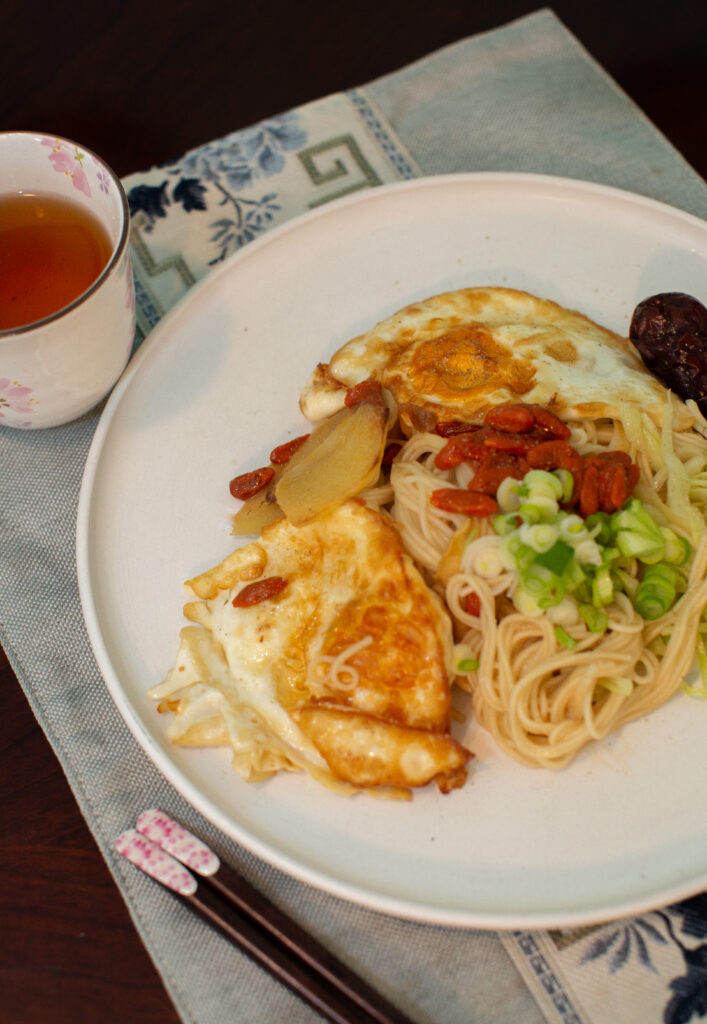By Jasmine Jones
Recipes tell the stories of communities and the people who shape them. Each recipe is more than a list of ingredients and steps; it is a written legacy of the individual who created the dish, their family and history. This monthly series highlights one of these legacies and gives readers the chance to create the recipe themselves. This story was first published in the April 2023 issue of The Best Years.
Shu-Chuan Wang-McGrath teaches Chinese language and Chinese civilization courses at Southeast Missouri State University, and every semester, she cooks a Taiwanese meal for her students. She does this to share what she has with others: her culture, food, time and company.
“It’s people who influence you,” Wang-McGrath says. “People brought you different perspectives of life, and I want to be that one [who brings new perspectives], as well [as] have an impact on my student. To have an impact on whoever comes along.”
Wang-McGrath grew up in Taiwan, a small island country approximately 100 miles off the coast of southeastern China. She says she’s lived “all over” the island, as a child growing up and as an adult teaching English at different universities. Her mother, Hsiu-Chin Huang, and sister, Shu-Ling Wang, currently live in Kaohsiung City in southern Taiwan, where they operate a food stand.
Wang-McGrath says Taiwan has been impacted and influenced by many cultures, including the Austronesian, Spanish, Dutch, Portuguese, Japanese and Chinese people. Chinese people have immigrated to Taiwan for centuries, and Wang-McGrath says at certain points in history, Chinese dynasties governed Taiwan before the country became separate again in 1949.
Taiwan was under Japanese colonial rule from 1895 to 1945, and Wang-McGrath says her grandfather spoke Japanese due to the influence Japan had on education at the time. Wang-McGrath herself speaks three languages: Mandarin Chinese, Taiwanese and English.
She says her childhood in Taiwan was filled with concerns of money and worries about her mother working too hard. While she was in junior high, her mother started a food stand, and between prepping food, running the stand and transporting everything, she got “just one hour of sleep” most nights. Wang-McGrath was inspired by “simply seeing” her mother work so hard, so she worked hard, too, waking up at 3 a.m. to study when she was a fifth grader.
Now, Wang-McGrath says her mother’s food stand is popular with international visitors returning to eat there. The food stand is located in an open air market in Kaohsiung City and serves popcorn chicken, vegetables, chicken heart, liver and sweet potatoes, among other foods.
Wang-McGrath’s sister has worked at the food stand since she was a child and now runs the operation. This past time when Wang-McGrath visited Taiwan, she tried to help her sister and mother at the food stand, but she “couldn’t keep up:” There were too many people ordering too many different things. It was chaos, but Wang-McGrath says her sister kept up easily.
“[My sister] could remember who is who. Some of them would ask, ‘I want chili in there. I want basil in there. I want this. I don’t want this.’ … She’s very smart,” Wang-McGrath says.
After receiving her undergraduate education, Wang-McGrath was prepared to study for her Master’s degree in Edinburgh, Scotland, but at the last minute, she applied to Southern Illinois University in Carbondale, Ill., and ultimately attended the school for her Master’s in linguistics. She received her doctoral degree in composition and TESOL (Teaching English to Speakers of Other Languages) from the Indiana University of Pennsylvania in Indiana, Penn.
Wang-McGrath taught at three universities in Taiwan before she moved to the United States to be with her husband, Mike McGrath. They lived in St. Louis before Wang-McGrath began teaching at Southeast Missouri State University in 2012.
Wang-McGrath makes Taiwanese sesame oil vermicelli or dumplings for her students every semester. When two students she taught in Taiwan visited her in the United States, Wang-McGrath says the first meal they requested was vermicelli.
Vermicelli is a form of thin rice noodle popular in many Asian countries. Wang-McGrath says the dish she makes using vermicelli noodles is a local recipe from the area her mother is from in Taiwan. It is typically served for birthday parties, because the long noodles represent longevity and prosperous health. She fries eggs as an added protein source with the dish. In her culture, she says eggs represent rebirth, “coming out of the past and into the new.”
“This [recipe] reminds me of the past and what I have [now] and what I can do to help others,” Wang-McGrath says.
She says the smell reminds her of her childhood and mother — it connects her to that world. The ingredients of the dish, especially ginger, also have health benefits that make the dish popular for postnatal care in Taiwan, Wang-McGrath says.
Wang-McGrath says sometimes students stop by her place randomly, and “of course” she will feed them. Sharing with others is extremely important to Wang-McGrath, and she wants to have a positive impact on everyone who enters her life.
“My life philosophy is nothing belong to me, but everything I have is to share. What is the meaning of life? … What is the meaning of longevity? … We wish a longer life, but I think that thread has to continue and extend,” Wang-McGrath says. “Your life will be extended when you pass down what you have and share it. Otherwise, what is that? You make money, it’s gone. What is that?”
Taiwanese Sesame Oil Vermicelli
Sesame oil
Eggs
Organic cabbage
Chinese dates
Goji berries
Ginger
Vermicelli noodles
Green onion
½ to 1 cup cooking wine
½ to 1 cup water
First, fill a large pan with sesame oil. Fry as many eggs as desired on medium heat, flipping on both sides until crispy around the edges. Set fried eggs aside.
Slice ginger into large, round portions to fry in the remaining sesame oil. Wait for ginger to brown around the edges. Then, add approximately ½ cup of cooking wine and ½ cup of water to the pan. Add Chinese dates and goji berries. Wait until the alcohol has dissolved and the liquid is boiling before adding vermicelli noodles. Move noodles while cooking to ensure they are thoroughly cooked through. Add more water if needed. Noodles will absorb liquid, but the dish should be soupy. Add chopped cabbage. Then, season with salt, pepper, bouillon or other spices.
Serve with chopped green onions and fried eggs. Enjoy!


